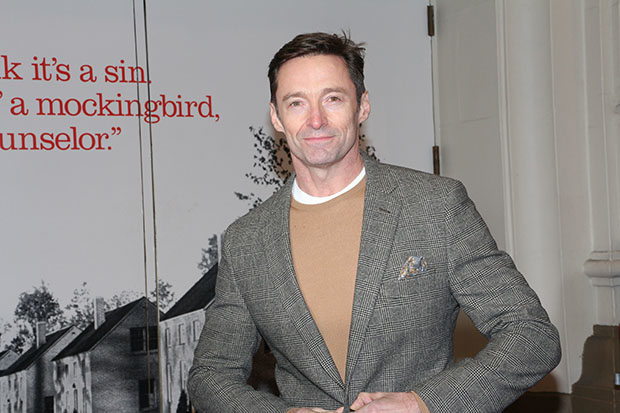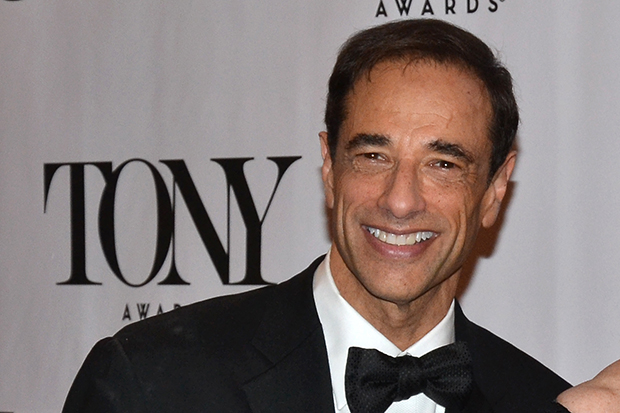Why Is Beetlejuice Being Evicted From Its Broadway Home?
Broadway’s biggest landlord exorcises the popular production to make way for ”The Music Man”.

(© Matthew Murphy)
Broadway fans were shocked this week to learn that Beetlejuice was being forced to vacate the Winter Garden Theatre on June 6, 2020, to make way for the forthcoming Broadway revival of The Music Man, starring Hugh Jackman. This is despite steadily rising ticket sales that broke a box office record for the Winter Garden over Thanksgiving week.
How could this happen? What are the agreements that govern a show’s right to perform in a Broadway theater? And could Beetlejuice cheat death by moving to a new venue? I’ll address it all in this Story of the Week.
Why is Beetlejuice leaving the Winter Garden?
The Shubert Organization (which is the largest landlord on Broadway) gave the producers of Beetlejuice formal notice on October 1 that the show would need to vacate, making its last official performance at the Winter Garden June 6.
This leaves the rest of the summer to make preparations for the The Music Man, which begins previews on September 9. While the revival’s theater has not been officially named, it has not escaped the attention of Broadway watchers that the show is currently selling tickets using a seating layout that bears an uncanny resemblance to the Winter Garden. When The Music Man finally does announce that it is moving into the Winter Garden in January, few will be surprised.

(© David Gordon)
While Beetlejuice has been doing healthy box office in recent weeks, The Music Man comes with the most bankable star of the past decade: Hugh Jackman. His last show on Broadway, Jez Butterworth’s The River, grossed nearly $1 million in one week, a huge number for an experimental drama at the intimate Circle in the Square Theatre. His 2011 concert, Hugh Jackman, Back on Broadway, consistently broke records at the Broadhurst Theatre and was the hardest-to-get ticket that holiday season. It’s a safe bet that The Music Man will follow a similar trajectory, and that is exactly the bet the Shuberts seem to have made.
But this has become something of a strange situation now that Beetlejuice‘s ticket sales are on the upswing. While the $1.6 million Thanksgiving haul is an outlier, the show grossed a respectable $1.1 million this past week. Strong word-of-mouth is leading to expanding advance sales ($7.6 million, according to the New York Times), putting the Shuberts in the awkward position of pulling the plug on a patient that was on the road to recovery.
You may be wondering how a Broadway landlord can eject a show that is paying its rent on time. In this case, they did it by invoking the stop clause.
What is a stop clause?
Stop clauses are standard in lease agreements between Broadway landlords and producers. It allows a landlord to boot a show that falls below a certain level of ticket sales for two weeks in a row. Beetlejuice did exactly that in May, shortly after opening night. It’s a bit like if your landlord got to look at your pay stubs each month and decide whether or not to evict you based on his findings.
Of course, there is a major difference: Residential landlords don’t receive a portion of your earnings on top of your rent. Broadway landlords do. In addition to receiving rent payments, they also get a cut of the box office, meaning that higher-earning shows generate more revenue for the landlord. This makes stop clauses a valuable tool for landlords, especially now that there are multiple shows circling Broadway, looking for a place to land.
The number Beetlejuice had to meet in its stop clause was in excess of $818,904 (the amount Beetlejuice brought in during its first full week of performances, when the stop clause was initially triggered). This seems like a high bar (School of Rock, which also played the Winter Garden, regularly dipped below $800,000 in weekly grosses throughout its three-year run). Did the Shuberts book Beetlejuice with an inordinately high threshold in its stop clause with the intention of keeping the Winter Garden warm for its desired tenant, The Music Man?

(© David Gordon)
“It’s no secret that the producer of Music Man wanted that theater,” Beetlejuice coproducer Hal Luftig told the Times earlier this week. He’s referring to Scott Rudin, one of the most powerful producers on Broadway. Rudin has a reputation for fiercely advocating for his shows, and if he feels like one of them belongs in a particular theater, he’s going to do everything he can to make it happen.
Couldn’t Beetlejuice just move to another theater?
The idea has been entertained by the Shuberts themselves. In a press statement, the organization said, “If an appropriate theater becomes available, we would certainly talk about moving the show.”
Shows used to move much more frequently than they do now: The original production of Fiddler on the Roof played the Imperial (1964-1967), the Majestic (1967-1970), and the Broadway (1970-1972). The long-running revival of Chicago opened at the Richard Rodgers in 1996 and upgraded to the Shubert (1997-2003) before landing at its current home, the Ambassador. Of course, that is a relatively minimal production in terms of design.

(© Matthew Murphy)
Technical innovations in scenic and lighting design make moving a show in 2019 a much heavier lift, especially an elaborate production like Beetlejuice. In an interview with BroadwayNews, Luftig estimated the cost of moving the show at $4 million, and not every theater would be able to accommodate David Korins’s shifting spook house of a set.
According to the Times, Warner Brothers (the lead producer on Beetlejuice) attempted to negotiate a compromise in which Warner would pay to relocate No show with id 328802 exists! (another Rudin production) to a smaller house so that The Music Man could instead move into that play’s current venue, the Shubert Theatre. Those negotiations broke down around money.
Now that Tootsie is closing, the idea of moving Beetlejuice into the Marquis Theatre has attracted some chatter: It’s a large modern house with ample wing space in the heart of Times Square. It is also owned by the Nederlander Organization, the second biggest landlord on Broadway and the Shuberts’ chief competitor. It would still be a huge endeavor for all parties, requiring the producers of Beetlejuice to shell out millions in moving expenses, and requiring the Nederlanders to put a hold on one of their largest theaters for at least six months (although a limited-run concert could conceivably play during that time).
Should this idea ever get past the wishful thinking stage, it could find a powerful champion in James L. Nederlander: He’s the president of the Nederlander Organization and a coproducer of Beetlejuice. He also knows something about moving things around the theater district.







